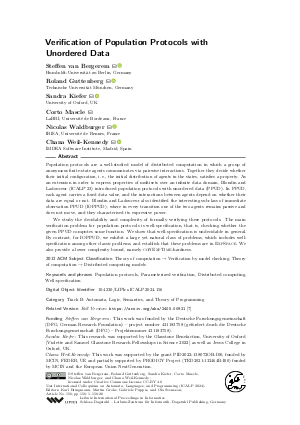@InProceedings{vanbergerem_et_al:LIPIcs.ICALP.2024.156,
author = {van Bergerem, Steffen and Guttenberg, Roland and Kiefer, Sandra and Mascle, Corto and Waldburger, Nicolas and Weil-Kennedy, Chana},
title = {{Verification of Population Protocols with Unordered Data}},
booktitle = {51st International Colloquium on Automata, Languages, and Programming (ICALP 2024)},
pages = {156:1--156:20},
series = {Leibniz International Proceedings in Informatics (LIPIcs)},
ISBN = {978-3-95977-322-5},
ISSN = {1868-8969},
year = {2024},
volume = {297},
editor = {Bringmann, Karl and Grohe, Martin and Puppis, Gabriele and Svensson, Ola},
publisher = {Schloss Dagstuhl -- Leibniz-Zentrum f{\"u}r Informatik},
address = {Dagstuhl, Germany},
URL = {https://drops.dagstuhl.de/entities/document/10.4230/LIPIcs.ICALP.2024.156},
URN = {urn:nbn:de:0030-drops-202993},
doi = {10.4230/LIPIcs.ICALP.2024.156},
annote = {Keywords: Population protocols, Parameterized verification, Distributed computing, Well-specification}
}

 Creative Commons Attribution 4.0 International license
Creative Commons Attribution 4.0 International license

